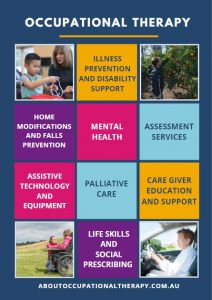GPs & Referrers

Occupational therapists are part of your care team
Occupational therapists assist in illness prevention and disability support (including chronic disease management), by supporting people to participate in meaningful activities (i.e. their occupations). They are qualified health professionals, trained to assist people to overcome limitations caused by injury or illness, psychological or emotional difficulties, developmental delay or the effects of ageing. They assist people to move from dependence to independence, maximising their personal productivity, well-being and quality of life.
Occupational therapists use a whole-person perspective to work with individuals, groups and communities to achieve optimal health and well being through participation in activities of daily living, including:
– Self-care activities: Such as showering, dressing, grooming and eating enable a person to remain active and independent
– Household and community functioning: Including home maintenance, driving, budgeting, shopping and community mobility
– Education: Activities which allow a person to participate effectively in a learning environment
– Leisure and play: Including hobbies and interests for relaxation, play and enjoyment
– Social participation: Interacting positively with others in the community
– Productivity: This may include paid or unpaid work such as employment, schoolwork, parenting and volunteer activities
Occupational therapists are also able to assess and recommend assistive technology and/or environmental modifications that will assist individuals to engage in these occupations.
Referring to an occupational therapist
As primary health care practitioners, a referral is not required to see a private practice OT. Private patients can claim a rebate through Private Health Insurance if it is included in their policy.
To access third party funding, a referral is usually required, with the process varying depending on the scheme. Please include the following information in your referral letter:
– Patient details
– Presenting complaint
– Goals for occupational therapy treatment
– Period of time or number of treatments the referral is valid for
– Include specialist reports, diagnostic test results and hospital discharge summaries where appropriate
– Your details, including provider number and date of referral
Funding Schemes for Occupational Therapists
– My Aged Care (Commonwealth Home Support Programme/Home Care Packages)
– Aids and Equipment Schemes
– Autism Spectrum Disorders
- Helping Children with Autism (transitioning to NDIS)
– DVA
– Medicare
- Better Access to Mental Health (GP Mental Health Care Plan)
- Chronic Disease Management / Enhanced Primary Care
– NDIS
– Transport Accident Bodies
- TAC (VIC)
- SIRA (NSW)
- iCare & Lifetime Care and Support (NSW)
– Workers Compensation Schemes
- Comcare
- iCare (NSW)
- Return to Work (SA)
- SIRA (NSW)
- Workcover (QLD, WA)
- WorkSafe (VIC, ACT, NT, TAS)

